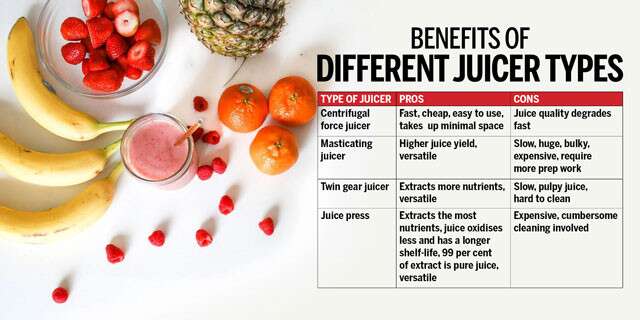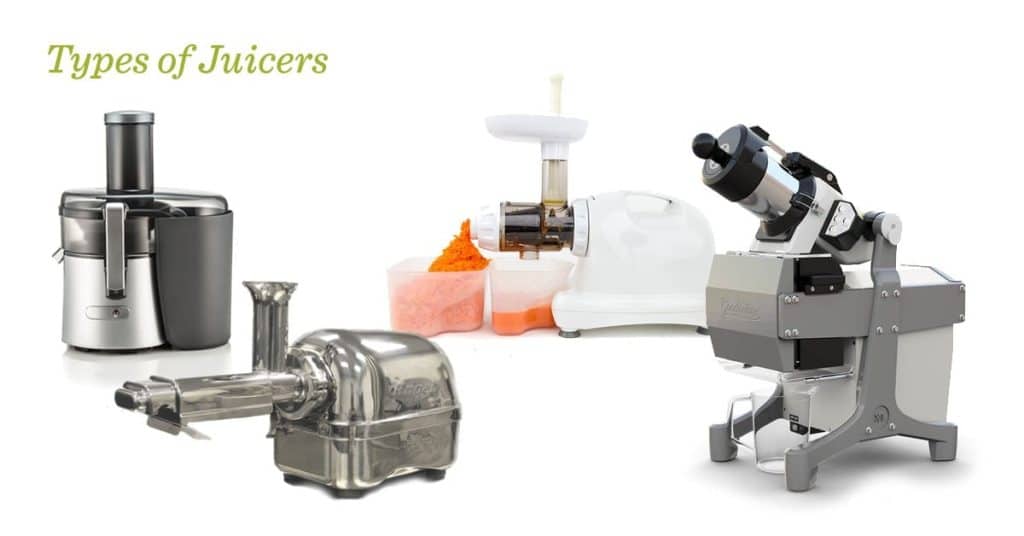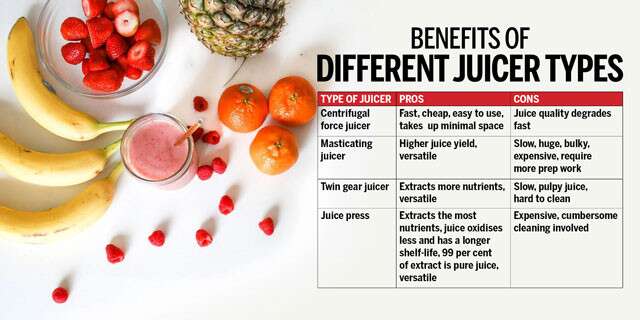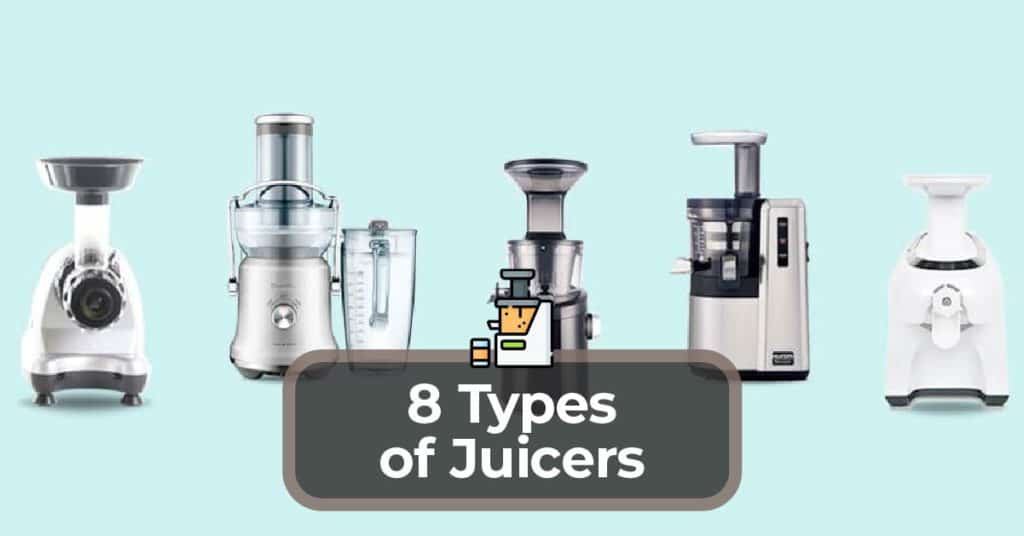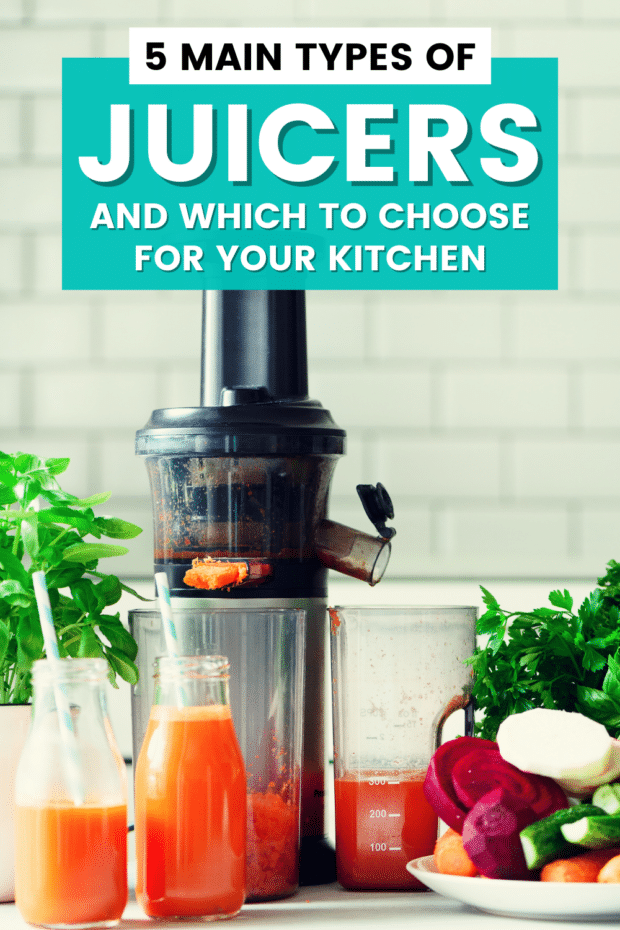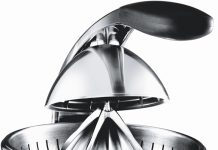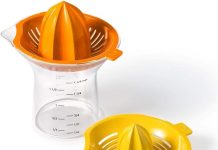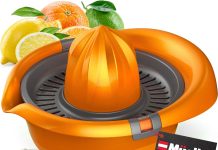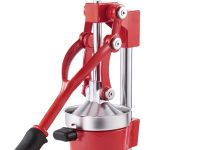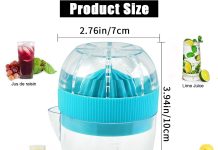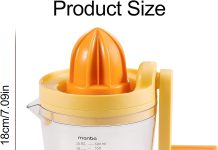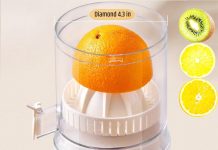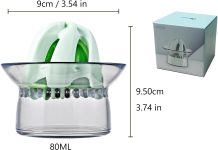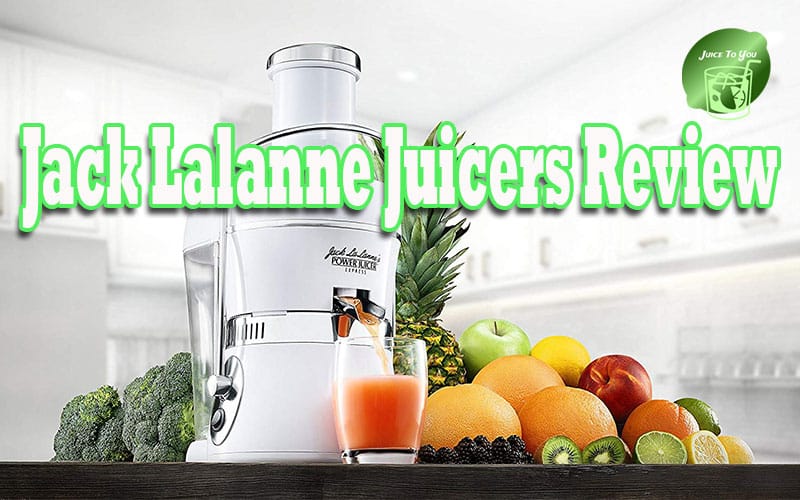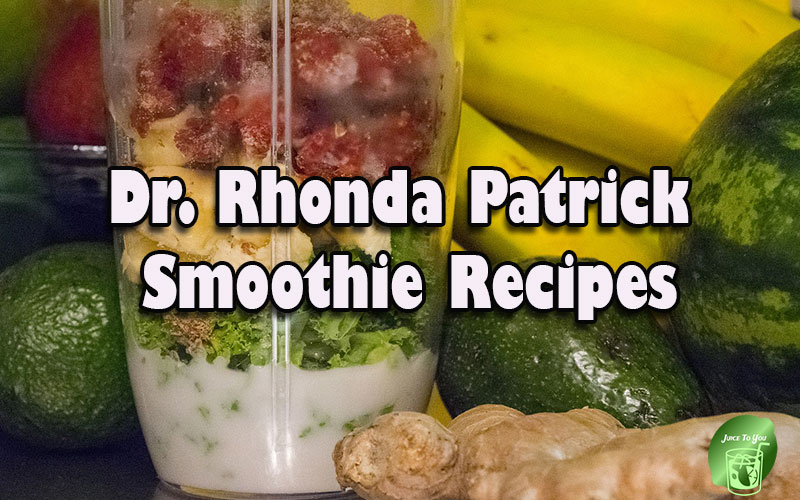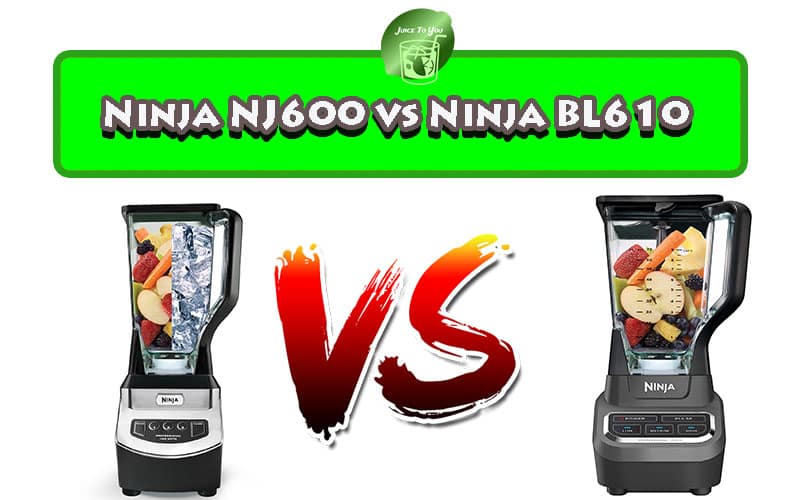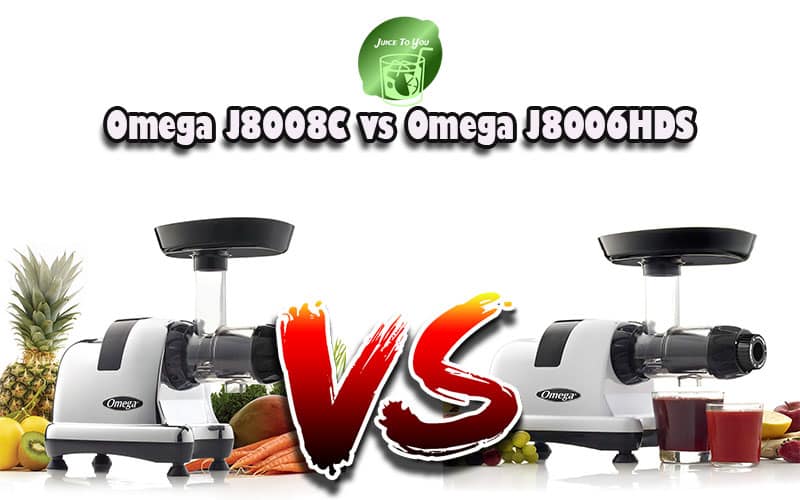Juicing has become increasingly popular, and for good reason! It’s a fantastic way to incorporate more fruits and vegetables into our daily diets, providing essential nutrients and hydration.
However, with so many juicer options on the market, choosing the right one for our needs can be overwhelming.
In this article, we’ll explore the various types of juicers available, from centrifugal to masticating, as well as their benefits and drawbacks.
By the end, you’ll better understand which juicer is best suited to elevate your juicing experience. Now, let’s get juicing!
Review contents
Centrifugal Juicers
Centrifugal juicers are one of the most popular and widely used types on the market. They use a high-speed spinning blade to extract juice from fruits and vegetables.
When you place your produce into the juicer, the blade rapidly spins and uses centrifugal force to separate the juice from the pulp. The juice flows through a spout, while the pulp is collected in a separate container.
Pros of Centrifugal Juicers
Centrifugal juicers have several advantages that make them popular among juicing enthusiasts. Firstly, they are swift and efficient. The high-speed spinning blade allows for quick juicing, making it perfect for busy individuals who don’t have much time to spare.
Additionally, they are generally more affordable than other types of juicers, making them a budget-friendly option for those who want to incorporate juicing into their daily routine.
Furthermore, centrifugal juicers are excellent at juicing hard and dense fruits and vegetables. They can easily handle produce like apples, carrots, and beets, extracting every last drop of juice. This makes them a versatile choice for juicing a wide range of ingredients.
Cons of Centrifugal Juicers
While centrifugal juicers have many advantages, they also have drawbacks. One of the main disadvantages is that the high-speed spinning blade generates heat during the juicing process.
This heat can potentially degrade some of the nutrients in the juice, resulting in a slightly lower nutritional value than other juicer types.
Additionally, centrifugal juicers are less effective at juicing leafy greens and soft fruits than other juicer types. They may struggle to extract the maximum juice from spinach, kale, or berries. If you primarily juice these types of produce, you may want to consider other juicer options.
Best Uses for Centrifugal Juicers
Centrifugal juicers are best suited for those who prioritize speed and convenience in their juicing routine. They are perfect for juicing hard and dense fruits and vegetables, making them ideal for creating refreshing juices with ingredients like apples, carrots, cucumbers, and more. They are also an excellent choice for those new to juicing or with a limited budget.
However, suppose you prefer to juice leafy greens or are looking to maximize the nutritional content of your juice. In that case, you may consider other juicer options, such as masticating or twin-gear juicers.
Masticating Juicers
Masticating juicers, also known as slow or cold press juicers, offer a different approach to juicing than centrifugal juicers. Instead of high-speed spinning blades, masticating juicers operate slower and use chewing or grinding to extract juice from fruits and vegetables.
Pros of Masticating Juicers
One of the most significant advantages of masticating juicers is their ability to juice various produce, including leafy greens, soft fruits, and wheatgrass. The slow and gentle juicing process helps preserve the ingredients’ nutrients, enzymes, and flavors, resulting in a higher-quality juice with a longer shelf life.
Additionally, masticating juicers generate less heat during the juicing process, which helps maintain the juice’s nutritional integrity. The slower process also minimizes oxidation, reducing the chances of the juice turning brown or losing its freshness.
Masticating juicers are also versatile in their functionality. Many models come with additional attachments that allow you to make nut butter, baby food, sorbets, and more. This makes them an excellent investment if you’re looking for a multi-purpose kitchen appliance.
Cons of Masticating Juicers
One of the main downsides of masticating juicers is their slower juicing speed than centrifugal juicers. The slower process means it takes more time to juice a larger produce. If you’re looking for a quick and efficient juicing experience, a masticating juicer might not be your best choice.
Another consideration is the higher price point of masticating juicers. Compared to centrifugal juicers, masticating juicers tend to be more expensive. However, their additional features and benefits often make them worth the investment for juicing severe enthusiasts.
Best Uses for Masticating Juicers
Masticating juicers are perfect for individuals who prioritize their juice’s quality and nutritional value. They shine when it comes to juicing leafy greens, soft fruits, and wheatgrass, extracting every last drop of juice while preserving the maximum amount of nutrients.
If you enjoy experimenting with different recipes and expanding your juicing capabilities, a masticating juicer with additional attachments can be a valuable addition to your kitchen. The ability to make nut butter, sorbets, and baby food opens up a world of possibilities for creating healthy and delicious homemade creations.
Citrus Juicers
As the name suggests, Citrus juicers are designed explicitly for juicing citrus fruits such as oranges, lemons, limes, and grapefruits. They come in various styles, including manual press, handheld reamers, and electric models.
How do Citrus Juicers Work?
Citrus juicers typically feature a cone-shaped reamer that you press onto the cut side of the fruit. By applying downward pressure and rotating the fruit, the reamer extracts the juice from the pulp and then travels down into a collection container.
Some manual press models are operated by hand, where you press the fruit onto a stationary reamer, while others are electric and handle the juicing process automatically. Handheld reamers, on the other hand, require manual exertion to squeeze the juice out of the fruit.
Pros of Citrus Juicers
Citrus juicers offer several advantages that make them famous for juicing citrus fruits. Firstly, they are simple to use and require minimal setup. You don’t need to worry about adjusting settings or attachments; cut the citrus fruit in half, place it on the reamer, and apply pressure. It’s a straightforward process that even beginners can master.
Another advantage is their efficiency in extracting juice from citrus fruits. Citrus juicers are designed explicitly with cone-shaped reamers perfect for efficiently extracting every last drop of juice. This results in a higher yield than other juicer types, where juicing citrus fruits may be less effective.
Cons of Citrus Juicers
One of the limitations of citrus juicers is their restricted functionality. They are designed specifically for juicing citrus fruits and may not be suitable for juicing other types of produce. You may need to consider alternative juicer types if you want a juicer that can handle various fruits and vegetables.
Some citrus juicers can also be pretty bulky, taking up valuable countertops or storage space in your kitchen. While manual handheld reamers are more compact and portable, electric citrus juicers may require more space due to their larger size.
Best Uses for Citrus Juicers
Citrus juicers are perfect for those who regularly consume citrus fruits and want a simple and efficient way to extract their juice. They are handy for making fresh orange juice, lemonade, or lime juice. If you love the tangy and refreshing flavors of citrus, a citrus juicer will be a valuable addition to your kitchen.
However, suppose you’re looking for a juicer that can handle a variety of produce beyond citrus fruits. In that case, you may want to explore other juicer options, such as centrifugal juicers or masticating juicers.
Twin Gear Juicers
Twin gear juicers, also known as triturating juicers, are considered the crème de la crème of juicers. They use two interlocking gears to crush and grind fruits and vegetables, extracting every last drop of juice and nutrients.
How to do Twin Gear Juicers Work?
Twin-gear juicers consist of two gears with sharp, interlocking teeth. As you feed the produce into the juicer, the gears rotate inward, crushing and grinding the ingredients to extract the juice. The resulting juice is slowly and gently pressed through a fine mesh screen while the pulp is collected separately.
Pros of Twin Gear Juicers
One of the most significant advantages of twin-gear juicers is their exceptional ability to extract juice from a wide range of produce. They excel at juicing hard and soft fruits, vegetables, leafy greens, and even wheatgrass. The powerful and efficient crushing and grinding action ensures maximum juice extraction and nutrient retention.
Twin gear juicers are also known for producing incredibly high-quality juice. The slow and gentle juicing process helps minimize oxidation and preserve the ingredients’ natural flavors, colors, and nutrients. The resulting juice is smoother, less bubbly, and can be stored for extended periods without significant degradation.
Cons of Twin Gear Juicers
One of the main drawbacks of twin-gear juicers is their high price point. They are typically more expensive than other juicer types, making them a severe investment to dedicated juicing enthusiasts. Additionally, twin-gear juicers are larger and heavier than others, requiring more counter space and storage area in your kitchen.
Furthermore, the thorough juicing process of twin gear juicers can be time-consuming. The gears’ slow rotation means it takes longer to juice a larger quantity of produce compared to faster juicer types like centrifugal juicers. A twin-gear juicer may not be the best choice if you’re looking for a quick and efficient juicing experience.
Best Uses for Twin Gear Juicers
Twin gear juicers are ideal for individuals committed to maximizing their juice’s nutritional content and quality. They are perfect for juicing various produce, including hard and soft fruits, leafy greens, and wheatgrass. If you enjoy experimenting with different juice recipes that incorporate various ingredients, the versatility of twin-gear juicers will be greatly appreciated.
If you’re serious about juicing and don’t mind the higher price point, the thorough juicing process, and the larger size, a twin-gear juicer is a worthwhile investment. It will provide you with a superior juicing experience and consistently high-quality juice.
Manual Press Juicers
Manual press juicers, also known as hand or citrus presses, offer a straightforward and hands-on approach to juicing. They are specifically designed for juicing citrus fruits but can also be used for certain other fruits and vegetables.
How do Manual Press Juicers Work?
Manual press juicers typically contain a press handle, a juice container, and a reamer or cone-shaped attachment. To juice a citrus fruit, you cut it in half and place it on the reamer. Then, by pressing down on the handle, you apply pressure to the fruit, extracting the juice. The juice flows down into the container, ready to be enjoyed.
Pros of Manual Press Juicers
One of the most significant advantages of manual press juicers is their simplicity and portability. They are easy to use, require no electricity or complicated settings, and are small enough to be easily transported or stored away. Their compact design makes them an excellent option for those with limited kitchen space or on-the-go juicing needs.
Manual press juicers also offer a hands-on and immersive juicing experience. The physical exertion required to press down on the handle adds a sense of satisfaction and control to the juicing process. It allows you to gauge the amount of pressure applied, resulting in a customized juicing experience tailored to your preferences.
Cons of Manual Press Juicers
One of the limitations of manual press juicers is their restricted functionality. While they are perfect for juicing citrus fruits, they may not be as effective at juicing other types of produce. Their design and mechanics make extracting juice from hard and dense fruits or leafy greens challenging. You may need to explore alternative juicer options if you primarily juice ingredients beyond citrus fruits.
Additionally, manual press juicers require physical effort to operate. The manual pressing motion can be tiring, especially if you plan on juicing large quantities of fruit. This may not be ideal for individuals with limited hand strength or mobility issues.
Best Uses for Manual Press Juicers
Manual press juicers are perfect for those who frequently juice citrus fruits and enjoy the hands-on experience of the juicing process. They are handy for making fresh orange juice, lemonade, limeade, or grapefruit juice. Their compact size and portability make them an excellent choice for traveling or juicing.
However, if you desire a juicer that can handle a variety of fruits and vegetables beyond citrus fruits, or if you prefer a more automated and less physically demanding juicing experience, you may need to consider other juicer options.
Auger Juicers
Auger juicers, also known as single screws or slow juicers, operate at a slower speed than centrifugal juicers. They use a unique auger or single screw to crush and extract juice from fruits and vegetables.
How do Auger Juicers Work?
Auger juicers feature a long, cylindrical auger or screw-like component that rotates slowly when you feed the produce into the juicer. As the drill turns, it crushes and grinds the ingredients, extracting the juice. The juice then flows through a fine mesh screen, separating it from the pulp collected in a separate container.
Pros of Auger Juicers
One of the main advantages of auger juicers is their ability to extract juice without generating excessive heat. The slow rotation of the drill prevents heat buildup, which can help preserve the juice’s nutritional integrity, flavors, and colors. This slow and gentle juicing method also minimizes oxidation, resulting in a prolonged shelf life for your juice.
Auger juicers are also known for their versatility in handling various produce. They can handle complex and soft fruits, vegetables, leafy greens, and even wheatgrass. This makes them a great option if you enjoy experimenting with different juice recipes that incorporate various ingredients.
Cons of Auger Juicers
One of the primary considerations when it comes to auger juicers is the slower juicing speed. The drill’s slow rotation means it takes more time to juice a larger quantity of produce compared to faster juicers like centrifugal juicers. If time is of the essence, a more efficient juicer may be a better fit for you.
Another consideration is the price point of auger juicers. They tend to be more expensive compared to centrifugal juicers. However, their added benefits and versatility often make them a worthwhile investment for juicing severe enthusiasts.
Best Uses for Auger Juicers
Auger juicers are perfect for those who prioritize the preservation of nutrients, flavors, and colors in their juice. They excel at juicing various produce, including hard and soft fruits, leafy greens, and wheatgrass. If you enjoy experimenting with different juice recipes and want the versatility to juice a wide range of ingredients, an auger juicer is an excellent choice.
Additionally, an auger juicer provides a compact and quiet juicing solution if you have limited kitchen space or prefer a juicer with less noise. Its slow and efficient juicing method ensures you can create high-quality juice without wasting too much space or disrupting your environment.
Blender-Style Juicers
Blender-style juicers combine the functionalities of a traditional blender and a juicer into one appliance. They can blend fruits and vegetables into smoothies and extract juice from produce.
How do Blender-Style Juicers Work?
Blender-style juicers feature a powerful motor, a blending container, and a filtration system. You blend the fruits and vegetables into the container to extract juice, creating a pulp. The pulp is then separated from the juice using a filtration system, a mesh, or a filter basket. The resulting juice is smooth and pulp-free, ready to be enjoyed.
Pros of Blender-Style Juicers
One of the standout advantages of blender-style juicers is their versatility. They offer the ability to create juices and smoothies in one appliance, eliminating the need to own separate machines. This can save time, money, and valuable kitchen space.
Additionally, blender-style juicers retain more fiber in the juice than other juicer types. The blending process incorporates the pulp into the juice, resulting in a thicker and more filling beverage. If you want to enjoy the health benefits of fiber-rich juices, a blender-style juicer is a great option.
Cons of Blender-Style Juicers
One of the main drawbacks of blender-style juicers is the presence of pulp in the juice. While some enjoy the added texture and fiber, others prefer a smoother and pulp-free juice. If you prefer a clear and pulp-free juice, you may need to strain the blended mixture using additional equipment.
Blender-style juicers also tend to be less efficient in extracting juice than dedicated juicers. The blending process may not be as thorough in fully extracting juice from the produce, resulting in lower yields than other juicer types.
Best Uses for Blender-Style Juicers
Blender-style juicers are ideal for those who enjoy both juices and smoothies and want the convenience of having one appliance that can handle both. They are perfect for creating nutrient-rich smoothies with added fiber content and can also be used to make delicious and hearty juices.
If you value versatility in your juicing routine and enjoy experimenting with different juice and smoothie recipes, a blender-style juicer is a valuable addition to your kitchen. It allows you to create a wide range of beverages and opens up endless possibilities for creativity and customization.
Steam Juicers
Steam juicers offer a unique method of extracting juice from fruits and vegetables by using steam to heat and separate the juice from the pulp.
How do Steam Juicers Work?
Steam juicers have multiple components, including a juice container, a steam basket, and a water reservoir. Water in the reservoir is heated to produce steam, which rises and passes through the steam basket. The fruit or vegetable is placed in the steam basket, and the steam gently heats it, causing the juice to separate and flow into the container.
Pros of Steam Juicers
One of the significant advantages of steam juicers is their ability to extract a high yield. The gentle steam heat effectively breaks down the fruits and vegetables, releasing the juice without the need for any physical force. This ensures you extract every last drop of juice from your produce, resulting in minimal waste.
Steam juicers are also great for preserving the natural flavors and nutrients of the juice. The gentle heating process helps to retain the flavors and aroma of the produce, resulting in a juice that closely resembles the taste of the original fruit or vegetable. Additionally, the steam juicing process’s lower temperatures help prevent enzyme degradation, ensuring that the juice retains its nutritional value.
Cons of Steam Juicers
One of the primary considerations with steam juicers is the time and energy required for the juicing process. Steam heating is generally slower than other juicer types that utilize mechanical force or high-speed blades. Additionally, it would be best to wait for the steam to heat and extract the juice, which can add time to the overall juicing process.
Steam juicers can also be bulkier and require more storage than other juicer types. The multiple components, including the juice container, steam basket, and water reservoir, must be stored separately, which may be challenging in smaller kitchens.
Best Uses for Steam Juicers
Steam juicers are perfect for individuals who want to extract a high juice yield with minimal effort. They are handy for juicing soft and delicate fruits and berries, as the steam heating ensures gentle and efficient extraction without damaging the produce.
If you value your juice’s natural flavors and nutrients and want to preserve them to the highest degree possible, a steam juicer can deliver exceptional results. It is an excellent choice for those prioritizing quality and yield in their juicing routine.
Wheatgrass Juicers
Wheatgrass juicers are specifically designed for juicing wheatgrass, a nutrient-dense green plant rich in vitamins, minerals, and enzymes.
How do Wheatgrass Juicers Work?
Wheatgrass juicers utilize a masticating or auger-style mechanism to extract the juice from wheatgrass efficiently. The juicer’s slow and gentle crushing and pressing action ensures maximum juice extraction and nutrient retention. The resulting juice is typically thick and vibrant green, indicating its high nutritional content.
Pros of Wheatgrass Juicers
One of the most significant advantages of wheatgrass juicers is their specialized design for juicing wheatgrass specifically. They are incredibly efficient at extracting juice from the fibrous grass, resulting in a high yield of nutrient-dense juice. The slow juicing process preserves the delicate enzymes and antioxidants in wheatgrass, ensuring you get the maximum health benefits from each glass of juice.
Wheatgrass juicers are also compact and portable, making them perfect for individuals with limited kitchen space or those who want to take their juicer on the go. Their small size allows for easy storage, and their lightweight nature ensures you can enjoy freshly squeezed wheatgrass juice wherever you go.
Cons of Wheatgrass Juicers
The main limitation of wheatgrass juicers is their restricted functionality. While they excel at juicing wheatgrass, they may not be as effective at juicing other types of produce. If you’re looking for a versatile juicer that can handle a wide range of fruits and vegetables, you may need to consider other options.
Additionally, wheatgrass juicers can be slower compared to other juicer types. The fibrous nature of wheatgrass requires a thorough and slow juicing process to extract the maximum amount of juice. A wheatgrass juicer may not be the best choice if you’re looking for a quick and efficient juicing experience.
Best Uses for Wheatgrass Juicers
Wheatgrass juicers are perfect for individuals specifically interested in juicing wheatgrass and incorporating its exceptional nutritional benefits into their diet. They are designed to extract the maximum amount of juice from wheatgrass, ensuring you receive a concentrated dose of vitamins, minerals, and enzymes.
If you’re a wheatgrass enthusiast looking to incorporate wheatgrass juice as part of a balanced and healthy lifestyle, a wheatgrass juicer is a valuable investment. It allows you to enjoy the full benefits of wheatgrass juice with ease and convenience.
Hydraulic Press Juicers
Hydraulic press juicers, also known as cold press or hydraulic juice presses, are top-of-the-line juicers offering superior juice quality and extraction.
How do Hydraulic Press Juicers Work?
Hydraulic press juicers use a hydraulic mechanism to extract juice from fruits and vegetables. The produce is first crushed or shredded into a fine pulp. Then, the pulp is placed into a cloth bag or filter and subjected to high pressure, which squeezes out the juice. The resulting juice is clear, pure, and free from pulp or solids.
Pros of Hydraulic Press Juicers
One of the significant advantages of hydraulic press juicers is their ability to extract juice with maximum efficiency. The high pressure applied to the pulp ensures that every last drop of juice is extracted, resulting in a high yield and minimal waste. The pure and clear juice produced by hydraulic press juicers is often regarded as superior in taste, texture, and nutritional quality.
Hydraulic press juicers also excel at juicing various fruits and vegetables, including hard and soft produce, leafy greens, and wheatgrass. Their versatility makes them an excellent option for those who enjoy experimenting with different juice recipes or want to juice a diverse range of ingredients.
Cons of Hydraulic Press Juicers
One of the primary considerations regarding hydraulic press juicers is their high price point. They are generally more expensive than other juicer types, making them a significant investment. However, their superior juice quality, efficiency, and versatility often make them worth the cost for juicing severe enthusiasts.
Also, hydraulic press juicers can be larger and heavier than other juicer types. They require more counter space and storage area in your kitchen, which may be challenging if you have limited available space.
Best Uses for Hydraulic Press Juicers
Hydraulic press juicers are perfect for individuals who prioritize juice quality and efficiency. They are ideal for those who want to extract the maximum amount of juice from various produce. A hydraulic press juicer will deliver exceptional results if you’re juicing hard and dense fruits, leafy greens, or wheatgrass.
A hydraulic press juicer is an excellent investment if you’re passionate about juicing and don’t mind the higher price point or the larger size. It provides you with a superior juicing experience, unparalleled juice quality, and the ability to extract the maximum nutrients from your produce.
In conclusion, the world of juicers is diverse and offers options to cater to various preferences, needs, and budgets. Each juicer type brings unique advantages and drawbacks, from the fast and efficient centrifugal juicers to the slow and nutrient-rich masticating juicers.
Consider your juicing goals, the types of produce you plan on, and your budget to determine the best juicer for your needs. Whether you value speed, convenience, nutrient retention, or versatility, there is a juicer out there that will suit your preferences and help you create delicious and healthy juices. Happy juicing!

